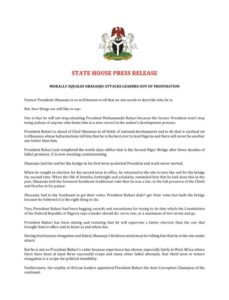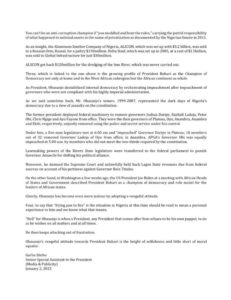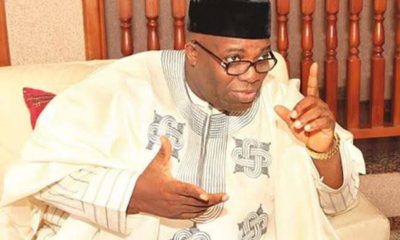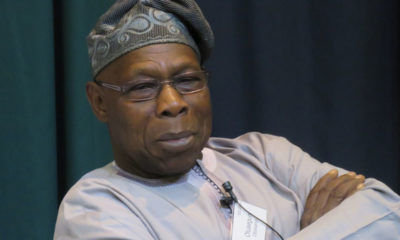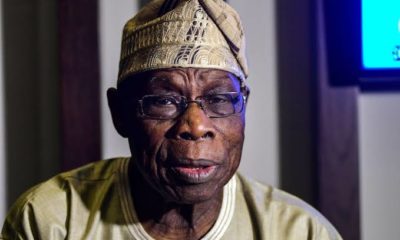Politics
Obasanjo Morally Squalid, Attacks Leaders Out Of Frustration – Garba Shehu

Garba Shehu, the Senior Special Assistant to President Muhammadu Buhari on Media & Publicity, has described former President Olusegun Obasanjo as a morally squalid individual who attacks leaders out of frustration.
In a letter, Mr. Obasanjo claimed that Mr. Buhari had dragged the country below its 1999 status.
Reacting, Mr. Shehu in a statement on Monday, said Mr. Obasanjo is so well known to all that no one needs to describe who he is.
His statement reads: “former President Obasanjo is so well known to all that no one needs to describe who he is.
“But, four things we will like to say:
“One is that he will not stop attacking President Muhammadu Buhari because the former President won’t stop being jealous of anyone who beats him to a new record in the nation’s development process.
“President Buhari is ahead of Chief Obasanjo in all fields of national development and to do that is cardinal sin to Obasanjo whose hallucinations tell him that he is the best ever to lead Nigeria and there will never be another one better than him.
“President Buhari just completed the world class edifice that is the Second Niger Bridge after three decades of failed promises. It is now awaiting commissioning.
“Obasanjo laid the sod for the bridge in his first term as elected President and work never started.
“When he sought re-election for his second term in office, he returned to the site to turn the sod for the bridge the second time. When the Obi of Onitsha, forthright and scholarly, reminded him that he had done this in the past, Obasanjo told the foremost Southeast traditional ruler that he was a liar, in the full presence of the Chiefs and Oracles in his palace.
“Obasanjo lied to the Southeast to get their votes. President Buhari didn’t get their votes but built the bridge because he believed it is the right thing to do.
“Two, President Buhari had been bagging awards and encomiums for trying to do that which the Constitution of the Federal Republic of Nigeria says a leader should do: serve one, or a maximum of two terms and go.
“President Buhari has been stating and restating that he will supervise a better election than the one that brought him to the office and to leave as and when due.
“Having tried tenure elongation and failed, Obasanjo’s fictitious mind must be telling him that he is the one under attack.
“But he is not on President Buhari’s radar because experience has shown, especially lately in West Africa where there have been at least three successful coups and many other failed attempts, that third term or tenure elongation is a recipe for political instability.
“Furthermore, the totality of African leaders appointed President Buhari the Anti-Corruption Champion of the continent.
“You can’t be an anti-corruption champion if “you meddled and bent the rules,” carrying the putrid responsibility of what happened to national assets in the name of privatization as documented by the Nigerian Senate in 2011.
“As an insight, the Aluminum Smelter Company of Nigeria, ALSCON, which was set up with $3.2 billion, was sold to a Russian firm, Russal, for a paltry $130million. Delta Steel, which was set up in 2005, at a cost of $1.5billion, was sold to Global Infrastructure for just $30million.
“ALSCON got back $120million for the dredging of the Imo River, which was never carried out.
“Three, which is linked to the one above is the growing profile of President Buhari as the Champion of Democracy not only at home and in the West African subregion but the African continent as whole.
“As President, Obasanjo destabilized internal democracy by orchestrating impeachment after impeachment of governors who were not compliant with his highly imperial administration.
“As we said sometime back, Mr. Obasanjo’s tenure, 1999-2007, represented the dark days of Nigeria’s democracy due to a slew of assaults on the constitution.
“The former president deployed federal machinery to remove governors Joshua Dariye, Rashidi Ladoja, Peter Obi, Chris Ngige and Ayo Fayose from office. They were the then governors of Plateau, Oyo, Anambra, Anambra and Ekiti, respectively, unjustly removed using the police and secret service under his control.
“Under him, a five-man legislature met at 6:00 am and “impeached” Governor Dariye in Plateau; 18 members out of 32 removed Governor Ladoja of Oyo from office; in Anambra, APGA’s Governor Obi was equally impeached at 5:00 a.m. by members who did not meet the two-thirds required by the constitution.
“Lawmaking powers of the Rivers State legislature were transferred to the federal parliament to punish Governor Amaechi for shifting his political alliance.
“Moreover, he damned the Supreme Court and unlawfully held back Lagos State revenues due from federal sources on account of his pettiness against Governor Bola Tinubu.
“On the other hand, in Washington a few weeks ago, the US President Joe Biden at a meeting with African Heads of States and Government described President Buhari as a champion of democracy and role model for the leaders of African states.
“Clearly, Obasanjo has become even more jealous by adopting a vengeful attitude.
“Four, to say that “frying pan to fire” is the situation in Nigeria at this time should be read to mean a personal experience to him and we know what that means.
” “Hell” for Obasanjo is when a President, any President that comes after him refuses to be his own puppet, to do as he wishes on all matters and at all times.
“He then keeps attacking out of frustration.
“Obasanjo’s vengeful attitude towards President Buhari is the height of selfishness and little short of moral squalor.”
Mr. Obasanjo, recently endorsed the Labour Party Presidential Candidate, Peter Obi, while ignoring the Presidential Candidate of the ruling All Progressives Congress (APC), Bola Tinubu despite being from the same region.
Politics
JUST IN: Reps Committee Finally Meets Rivers Sole Administrator After Delays
After a series of delays, the House of Representatives ad hoc committee on Rivers State has finally held its much-anticipated meeting with the Sole Administrator of the state, Retired Vice Admiral Ibok Ete Ibas.
The meeting, which took place in Abuja, comes as the House exercises its constitutional powers to assume the functions of the Rivers State House of Assembly, following the ongoing political crisis in the state.
In his opening remarks, Vice Admiral Ibas apologised for his inability to attend earlier scheduled meetings, citing the need for more time to settle into his new role.
READ ALSO: Ibas Makes First Appearance At NEC Meeting As Rivers Sole Administrator
He told the committee that he is still acclimatising to the demands of his position and appealed for the lawmakers’ understanding as he prepares to provide a detailed briefing.
Shortly after his plea, the session went into a closed-door meeting, with journalists and observers asked to leave.
More to follow………….
Politics
Obi, Kwankwaso Helped Tinubu In 2023, Will Do The Same In 2027, Says Nigerian Activist
Deji Adeyanju, a Nigerian activist and lawyer, has made explosive claims regarding the 2023 presidential election, suggesting that former Labour Party (LP) candidate Peter Obi and New Nigeria Peoples Party (NNPP) leader Rabiu Kwankwaso secretly supported President Bola Tinubu’s campaign.
In a post shared on his 𝕏 page Thursday, Adeyanju contended that Obi, who ran against Tinubu, would likely continue to support the president in future political endeavors.
He expressed certainty that Obi would decline any efforts to form a coalition aimed at challenging Tinubu in the next election.
READ ALSO: Lad Who Stood In Front Of Obi’s Convoy Apprehended For Street Fighting – Police
“I’m 100% convinced that Obi worked for Tinubu in 2023 and will do so again. I might be wrong, but I’m convinced in my mind about this,” Adeyanju wrote.
“Once a businessman, always a businessman. Those still in doubt will see the clear handwriting before 2027. He will refuse to join the coalition,” he continued.
Additionally, Adeyanju accused Kwankwaso of working in favor of Tinubu during the previous election.
He emphasized that for any opposition coalition to succeed in the 2027 race, figures like Obi and former Vice President Atiku Abubakar—another presidential hopeful—must step aside.
“For the coalition to succeed, all the self-centered politicians like Atiku & Obi should promise not to run and allow neutral folks to run against Tinubu,” Adeyanju proposed. “This is how to put the interest of the nation above personal interest,” he added.
The activist went on to criticize the culture surrounding Nigerian politics, describing it as an industry driven by opportunism.
He lamented the presence of “merchants” surrounding top politicians, accusing them of putting personal gain ahead of the country’s well-being. “The biggest industry in Africa is politics,” Adeyanju said.
“And those around popular politicians are all merchants. Once politics is around the corner, they are in business. Con men and women who just want to cash out.”
Politics
Ibas Makes First Appearance At NEC Meeting As Rivers Sole Administrator
Retired Vice Admiral Ibok-Ete Ibas, the Sole Administrator of Rivers State, attended his first National Economic Council (NEC) meeting today at the Presidential Villa in Abuja.
Ibas was appointed to the position by President Bola Tinubu following the suspension of Governor Siminalayi Fubara in March 2025.
READ MORE: Tinubu Swears In Ibas As Rivers Sole Administrator
The NEC meeting, which is being presided over by Vice President Kashim Shettima, gathered a number of state governors and deputy governors from across the 36 states of Nigeria to discuss important national economic issues.
Among the notable figures in attendance was Governor Sheriff Oborevwori of Delta State, who recently defected to the All Progressives Congress.
Governor Oborevwori led the opening prayers at the meeting on the instruction of Vice President Shettima.
Other state governors present included Rev. Fr. Hycinth Alia of Benue State, Abdulrahman Abdulrazak of Kwara, Monday Okpebholo of Edo, and Bassey Otu of Cross River, along with several deputy governors.

